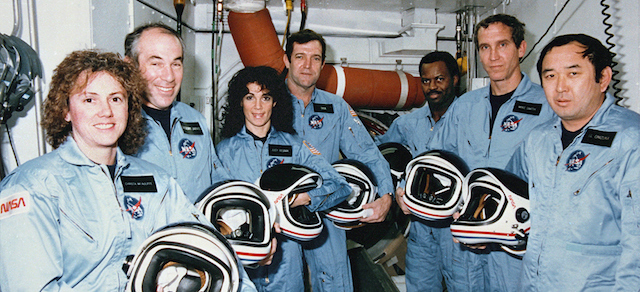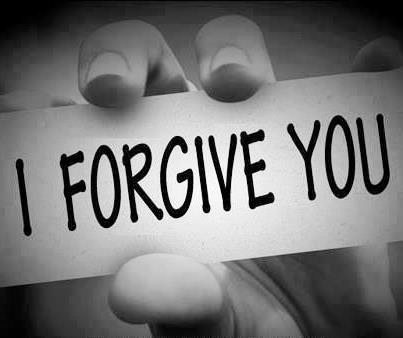
Unless it has been replaced, the men’s room mirror at Manning’s Cafe in Minneapolis is a little worse for wear. Not broken, but scratched and pitted, and midway across the bottom the words are indelibly scrawled, “Forgive Yourself.” No telling who wrote it or how long ago, even less what they meant. Was it a pep talk from a weary (and likely inebriated) soul to his own downtrodden self? An encouragement to others? I know a former seminarian (no few have closed down Mannings at 2 am) who was observed, on occasion, to absolve half the room–did someone take offense? Whatever the intent, the message persists: forgive yourself. It is a common message. I suspect it was intended to be liberating, though it never works out that way.
 Before you read further, go ahead and check out this heartbreaking four minutes from NPR’s Howard Berkes (which Ethan mentioned in the latest Another Week Ends). To summarize: In January 1986, Robert Ebeling was an engineer for Morton Thiokol, a NASA contractor working on the Challenger launch. He and four others pleaded for the launch to be delayed; they anticipated the precise failure that would destroy the shuttle and kill its seven occupants. Their pleas were refused. Three weeks after the explosion, he and another engineer, since deceased, spoke to NPR. Ebeling was not identified by name until this past week:
Before you read further, go ahead and check out this heartbreaking four minutes from NPR’s Howard Berkes (which Ethan mentioned in the latest Another Week Ends). To summarize: In January 1986, Robert Ebeling was an engineer for Morton Thiokol, a NASA contractor working on the Challenger launch. He and four others pleaded for the launch to be delayed; they anticipated the precise failure that would destroy the shuttle and kill its seven occupants. Their pleas were refused. Three weeks after the explosion, he and another engineer, since deceased, spoke to NPR. Ebeling was not identified by name until this past week:
Ebeling retired soon after Challenger. He suffered deep depression and has never been able to lift the burden of guilt. In 1986, as he watched that haunting image again on a television screen, he said, “I could have done more. I should have done more.”
He says the same thing today, sitting in a big easy chair in the same living room, his eyes watery and his face grave. The data he and his fellow engineers presented, and their persistent and sometimes angry arguments, weren’t enough to sway Thiokol managers and NASA officials. Ebeling concludes he was inadequate. He didn’t argue the data well enough.
A religious man, this is something he has prayed about for the past 30 years. “I think that was one of the mistakes that God made,” Ebeling says softly. “He shouldn’t have picked me for the job. But next time I talk to him, I’m gonna ask him, ‘Why me. You picked a loser.’ “
 Roger Boisjoly, the other Morton Thiokol engineer to speak with NPR 30 years ago, responded differently. He insisted that they had complained to the right authorities, made their best case, and so had done the right thing. Having done all they could, they were blameless. One might mistake Boisjoly’s protest of righteousness for self-forgiveness, but they are not at all the same. An innocent man needs no forgiveness. Whether Boisjoly believed his own words is now beyond telling; Bob Ebeling, for his part, never quite has. A protest of righteousness must be certain to be effective. Any shred of doubt scuttles it, making it a bluff and eating the protestor alive from the inside. Job had that certainty, perhaps Roger Boisjoly did, but Robert Ebeling does not. What if we had argued harder, smarter, been willing to resign in protest? What if, what if, what if…?
Roger Boisjoly, the other Morton Thiokol engineer to speak with NPR 30 years ago, responded differently. He insisted that they had complained to the right authorities, made their best case, and so had done the right thing. Having done all they could, they were blameless. One might mistake Boisjoly’s protest of righteousness for self-forgiveness, but they are not at all the same. An innocent man needs no forgiveness. Whether Boisjoly believed his own words is now beyond telling; Bob Ebeling, for his part, never quite has. A protest of righteousness must be certain to be effective. Any shred of doubt scuttles it, making it a bluff and eating the protestor alive from the inside. Job had that certainty, perhaps Roger Boisjoly did, but Robert Ebeling does not. What if we had argued harder, smarter, been willing to resign in protest? What if, what if, what if…?
Ebeling is described as religious. Given his residence in Brigham City, Utah, odds are he is a devout Mormon. We know that he prays, and we can guess that he believes God is in some sense merciful. But no forgiveness seems to have reached Mr. Ebeling’s ears. The Mormon faith and American Christianity at large, however different they may be on such critical doctrines as the Trinity, are stunningly similar in their disdain for spoken absolution. This is a nation full of Christian people who believe that God forgives, but have rarely if ever heard the words, “Your sins are forgiven” directed to them. Forgiveness has become a concept, often associated with Jesus, but not a word spoken with the tongue or heard with the ear. If forgiveness is an act, it is strictly an internal one, a movement of the will or emotions. I ask my therapist how I can forgive someone who has harmed me, but by this I do not mean actually absolving them with my words. I mean, “How can I feel okay about the past?”
 It is no wonder that Robert Ebeling feels God has picked a loser. He cannot be okay with the past, since it involved the deaths of seven other people. If God is forgiving, perhaps Ebeling has heard a sermon about that or read it in a book. But his only surety is that God chose him to stand in front of his bosses and fail. Against such omnipotent choosing, an 89 year-old retired engineer in Utah has no chance. He has not heard a different word from the law that condemns him.
It is no wonder that Robert Ebeling feels God has picked a loser. He cannot be okay with the past, since it involved the deaths of seven other people. If God is forgiving, perhaps Ebeling has heard a sermon about that or read it in a book. But his only surety is that God chose him to stand in front of his bosses and fail. Against such omnipotent choosing, an 89 year-old retired engineer in Utah has no chance. He has not heard a different word from the law that condemns him.
The notion of forgiving oneself rests on an illusion of objectivity. It is abstract forgiveness. Perhaps I can conclude that the sort of person whose thoughts, words and deeds are like mine is forgivable, but to “forgive myself” is not to reach any such conclusion. It’s not about someone like me. It’s about me, and so to forgive myself would mean actually becoming another person, to stand in the same relation to myself as I do to everyone else. I have been lost in a crowd, but never so lost that I couldn’t remember which one was me! There is no hope that way.
Our instructor in this matter is little-known theologian Janice Estey and her 1996 Grand Prize winning entry in the Bulwer-Lytton Fiction Contest: “Ace, watch your head!” hissed Wanda urgently, yet somehow provocatively, through red, full, sensuous lips, but he couldn’t you know, since nobody can actually watch more than part of his nose or a little cheek or lips if he really tries, but he appreciated her warning.

Wanda may as well have said, “Ace, forgive yourself!” but you can’t, you know. Not just because forgiveness comes from God alone, though that much is true. You can’t forgive yourself because the angle is all wrong, the mechanics nonsense. Attempting to forgive yourself is like my six month old attempting to devour his own body, starting with the feet. He won’t get very far, and it’s not worth trying to picture what would happen if he got all the way to the head. The words sound as if they must mean something, but they cannot take shape in this world.
I wonder what Mr. Ebeling’s life might have been like this last three decades if, instead of “It’s not your fault,” some friend had just once opened his mouth and said, “Jesus sent me to tell you something. I forgive you.” Maybe that’s happened, but I doubt it. For far too many, it never does. When I think about that, I feel guilty, as a Christian and a preacher, for all the times I have had nothing much to say, and soon I discover that I am trying to forgive myself for this, and I know what I need to hear again. I don’t suppose I’ll run into Bob Ebeling any time soon; if you happen to, let him know somebody has a message for him.

COMMENTS
4 responses to “Forgive Yourself, or Die Trying”
Leave a Reply













instead of all this talk about forgiving myself, I need to ACCEPT forgiveness from God…..a good reason for step 5 in recovery……I admit to God for forgiveness, to myself for awareness , and another human being for humility……..
Adam: I was at Manning’s for lunch a couple of days ago. Had the world’s grumpiest waitress. She was so outstanding in grumpiness I left a good tip in appreciation. Thanks for the article. Loved it!
Uncle Rick
My heart goes out to Robert Ebeling, for I have known his terrible torment. So, may I bring an added revelation to the truth that God brought to you, dear Sir.
In my heart I have held the courtroom’s gavel in a death-grip. White-knuckled. We pass judgment on ourselves. We continue the court-room. In doing so, we inadvertently affirm over and over that love IS conditional.
It’s not God who makes his love conditional. It’s you and I. And God is not impressed.
That moment of revelation, when in losing control we hand the gavel over to God, he does a surprising thing. He throws the gavel over his shoulder, he shutters the doors to the courtroom closed. And he comes to you, kisses the scars in your palm that held the gavel for so long, then he takes you by the hand in love.
Forgiveness at this depth is beyond human comprehension. The salve for the scars on our palm is the healing blood of Jesus. Life flows into us from Him. The courtroom is over. It’s time to move into life.
[…] Shed 30 Years of Guilt.” If you’re unfamiliar with the story (start by reading Adam’s post here), Ebeling was one of the NASA engineers responsible for launching the space shuttle Challenger in […]